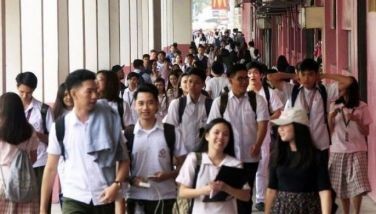Teachers lead fight vs misinformation
Well-prepared teachers spell great students. Subject matter mastery provides many opportunities for teachers who spend a great deal of time in classrooms.
Many colleges and universities are refocusing their education curriculum to provide emphasis to content and meeting the standards of teaching in the recently introduced K to 12 programs of the Department of Education.
The department is committed to support teachers through DepEd Order no. 42 S2017, or the National Adaptation and Implementing of the Philippine Professional Standards for Teachers (PPST). It is the basis for all learning and development programs for teachers and can be used for the selection and promotion of teachers.
Mentoring and coaching is a vital process for the development of teachers to improve their teaching competencies through the continuous application of the processes and administration of technical assistance.
However, in the age of misinformation and irresponsible use of media and information technologies, even teachers can fall victim to wrong information, fake news in particular.
Development trainings on educators inclusive of professional standards in the continuing professional development and advancement of teachers based on the principle of life-long learning should highlight the importance of media and information education.
This Continuing Professional Development (CPD) hopes to guide teachers on the analysis of resources, skills and competencies and relevance of information that they access.
Media and Information Literacy (MIL) trainings introduce the learner to a basic understanding of media and information as channels of communication, their function as tools for societal development, and how they operate given optimal (or inadequate) conditions to perform these functions.
It will engage teachers to explore the various ways to search, organize, critically evaluate, share, retrieve, create and use media and information in decision-making and problem-solving activities. In return, they will become effective in discussing societal issues that create an atmosphere of interactive class discussions.
While there are many informal learning and media resources available on media education, with additional attention given to it, we are opening opportunities to educators to access essential training in developing responsible and ICT consumption.
At the moment, the current Department of Education’s Senior High School Media and Information Literacy curriculum is expansive and the number of topics is overwhelming to both teachers and students.
In response, many premier universities in the country offer a number of media and information literacy workshops that encourage the evaluation of media and information sources based on their sources, and the messages being conveyed.
The Center for Media Freedom & Responsibility (CMFR) is one of many respected institutions that hold MIL seminars to further promote the importance of the responsible usage and understanding of different context from various media platforms.
In addition, these seminars recognize the functions of media and information sources in classroom teaching and learning and thus promote the individual’s right to communicate and express in a friendly and enjoyable manner.
We can win the fight against misinformation, and the battle begins with educators who will guide students to meaningful engagement in the age of information.
Mary Antonette T. Buñag currently serves as Education Program Specialist II for Human Resource at the Schools Division Office-Manila. She previously worked as a university instructor for five years.
- Latest





























